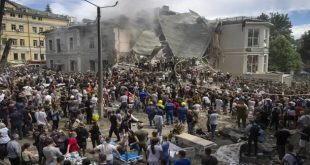A day before long-time leader Sheikh Hasina suddenly fled to Bangladesh amid deadly protests, the army chief held a meeting with his commanders and decided that the army would not open fire on civilians to enforce the curfew, which Two serving military officials familiar with the conversation told Reuters.
Chief of Staff Waker-Uz-Zaman contacted Hasina’s office, informing the prime minister that her forces would not be able to implement the lockdown she had requested, according to an Indian government official told the inquiry. The message is clear, the official said: Hasina no longer has the support of the military.
Details of the online meeting between the army chiefs and the message sent to Hasina that she has lost their support have not been reported before. They help explain how Hasina’s 15-year rule, which has had little tolerance for opposition, came to sudden turmoil on Monday, when she fled Bangladesh for India.
The ban was imposed across the country after at least 91 people died and hundreds were injured in clashes across the country on Sunday, the deadliest day since student protests against Hasina began in July.
Army spokesman Sami Ud Dowla Chowdhury confirmed Sunday evening’s talks, which he described as regular meetings to get stock whenever there is a breakdown. He did not give details when asked other questions about the decision made at the meeting.
Hasina could not be reached and her son and advisor, Sajeeb Wazed, did not respond to repeated requests for comment. Reuters interviewed 10 people with knowledge of events last week, including four military officials and two other sources briefed on Bangladesh, to summarize the last 48 hours of Hasina’s rule. Most of them spoke on condition of anonymity because of the sensitivity of the subject. Hasina, who has ruled Bangladesh for 20 of the past 30 years, was elected leader of the nation of 170 million in January after thousands of opposition leaders and activists were arrested. His main candidates withdrew from the election. Since the summer, Hasina’s hold on power has been challenged by the revelations of court rulings that have kept public services – in high demand and high unemployment among the youth – for some residents. .
The decision was overturned, but the protests quickly turned into a movement to oust Hasina.
Zaman has not publicly explained his decision to withdraw his support for Hasina. But the scale of the protests and the death toll (at least 241) justify any support for Hasina, three senior Bangladeshi army chiefs told Reuters. There was a lot of tension among the soldiers, retired Brigadier General M Sakhawat Hossain said. That’s what puts pressure on the head of the military, because the military is coming out to see what’s going on. Zaman, who is related to Hasina by marriage, showed signs of backing down in his support for the prime minister on Saturday, when he sat on a wooden chair and addressed hundreds of police officers in meeting time in the town hall. The military later made some comments about the conversation public. The commander said that lives must be spared and appealed to his personnel to be patient, army spokesman Chowdhury said.
It was the first sign that the Bangladeshi army would not use force to suppress the violent protests, leaving Hasina behind. Retired soldiers, like Mohammad Shahedul Anam Khan, were among those who defied the law and returned home on Monday and took to the streets.
The army did not stop us, said Khan, a former child soldier. The soldiers did what they said they would do.
“A short notice.”
On Monday, the first full day of the indefinite national lockdown, Hasina took refuge in the Ganabhaban, or People’s Palace, a heavily guarded compound in the capital Dhaka that serves as her residence. Outside, in the sprawling streets of the city, a crowd gathered. Tens of thousands of people answered the call from the protest leaders for a demonstration to oust the leader, entering the center of the city. Situation escaping him, the 76-year-old leader decided to flee the city on Monday morning, as an Indian government official and two Bangladeshi citizens knew about this.
Hasina and her sister, who live in London but were in Dhaka at the time, discussed the matter and flew together, according to Bangladeshi sources. They left for India around noon in the country.
India’s Foreign Minister Subrahmanyam Jaishankar told parliament on Tuesday that New Delhi called on various political forces to resolve the situation through talks in July. But as crowds gathered in Dhaka on Monday, defying orders to return home, Hasina decided to resign after a meeting with top security officials. At short notice, he requested permission to come to India temporarily. A second Indian government official said Hasina was sent politically and her stay would be temporary due to fears of a negative impact on Delhi’s relations with the next government in Dhaka. The Indian Mission did not immediately respond to a request for comment. Nobel laureate Muhammad Yunus, who the student protestors want to lead a caretaker government after Hasina’s ouster, told The New Indian Express that India has a good relationship with the wrong people… Please watch politics your government abroad.
Yunus was not immediately available for an interview. On Monday afternoon, a Bangladesh Air Force C130 aircraft landed at Hindon Airport near Delhi with Hasina on board.
He was greeted by Ajit Doval, India’s senior national security adviser, according to India’s top security official. Delhi fought to separate Bangladesh from East Pakistan in 1971. After Hasina’s father was assassinated in 1975, Hasina fled to India for several years and had close ties with her country’s politicians. Returning to Bangladesh, he came to power in 1996 and seemed to be more sensitive to India’s security concerns than his fellow politicians. The Hindu-majority nation also sees the global situation as a boon for Bangladesh’s 13 million Hindus. But in Bangladesh, even among retired soldiers, anger remains that Hasina was allowed to leave.
Personally, I think he should not be given security, said Khan, a veteran. It’s crazy


